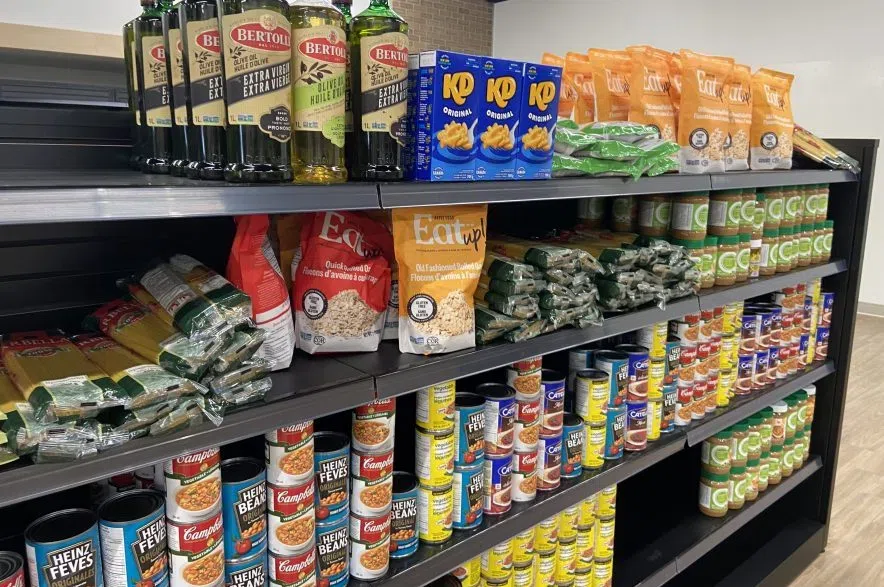Saskatchewan oats are rolling west while B.C. veggies are rolling east, all in the name of helping feed people in need.
The Regina Food Bank and the Greater Vancouver Food Bank have struck a unique partnership, trading truckloads of locally grown food across provincial borders.
Read more:
- Regina Food Bank steps up in response to influx of wildfire evacuees
- Regina and Saskatoon food banks see increase in demand in 2024
- Saskatoon food bank creates children’s space as more rely on services
Regina is sending pulses, grains and oats, while Vancouver is sending fresh vegetables in return.
Regina Food Bank CEO John Bailey said during an appearance on the Greg Morgan Morning Show that the trades are meant to help fill gaps on food bank shelves, while also sharing a surplus of what they have on hand.
Listen to the full interview with Bailey, or read the transcript below:
The following questions and answers have been edited for length and clarity.
GREG MORGAN: Can you tell me about this partnership between the Regina Food Bank and the Greater Vancouver Food Bank?
JOHN BAILEY: What we’ve sort of realized between conversations between both our food banks is we have an abundance of crops that come from our part of the world, but they’re not necessarily abundant if we sort of go across the country. So for us, we have an incredible selection of pulses, grains, oats and that kind of stuff. And for (the Greater Vancouver Food Bank), they have lots of garden vegetables coming out of the ground almost year round. We realized that if we have a lot of this and you have a lot of that, maybe we can trade off and make sure there’s more to go around for everybody.
How innovative is this plan to share? Is this an original idea, or did you find it from some other food banks that have been doing it?
BAILEY: From what we can tell, we’re the first to sort of do this idea. Food goes across Canada and the Food Bank Network all the time, but it’s the first time that there has been a real focus on locally grown products going into different markets to serve different city populations, so in that respect it’s really unique. The other thing is just the way we’re handling the logistics. A truck goes out full and it comes back full, and no wasted energy or effort is made to ensure everything’s getting there as quickly and efficiently as possible.
What are you sending, and what are you receiving?
BAILEY: We’ve sent out oats, lentils, some of our packaged soup product that we produce here locally, as well as some pastas. What we’re getting from them is tomatoes, zucchinis, carrots, potatoes and those types of things, to help fill up our fresh part of the pantry and help supplement some of their dry-goods needs, making sure that we’re matching needs with needs.
Are the trades equal?
BAILEY: They are 100 per cent equal. So it’s 45,000 pounds coming to us and 45,000 pounds going out to them. It doesn’t mean there’s any less for the folks in Regina; it just means we have a little bit of a surplus and they have a little bit of a surplus. So rather than have that be a problem, we turn it into an opportunity, and we think it’s a way to serve both our communities better.
Is it effective to send the truck back and forth?
BAILEY: Absolutely. The total cost for trucking was about $6,000. If we look at the rough market value of the product moving back and forth, it was about $250,000, so it is really cost effective. Honestly, we’re looking at sort of return on investment in terms of what both organizations are getting for a $6,000 cost.
Has the phone been ringing at all from others who have caught on to what you are doing and are asking for advice?
BAILEY: They are, and we’re happy to provide it. I think one of the things that animates both us and Vancouver is this idea of Canada as a nation that produces more than enough food to feed the entire population. But one in four Canadians is food insecure, so there’s a distribution problem, not a food problem. So if we can build a playbook that helps others out and gets us going, and we start seeing more and more of this and it becomes more standard business, as opposed to a one-off, that would be an incredible outcome of this project.
Do you see this initiative expanding one day to a point where you’re trading with other food banks in different cities across Canada all at once?
BAILEY: That is our hope. We’re in conversations with Winnipeg, Calgary, Edmonton and are currently working with Vancouver. Then, as we get the prairie and west region figured out, I am hopeful we can start figuring out how it will work as we go further east into Ontario, Quebec and the Maritimes.











